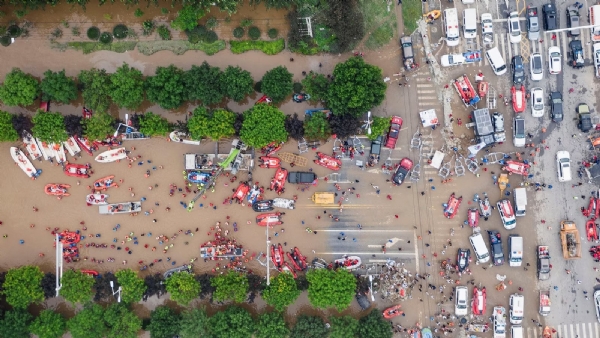NB Explains | To save Beijing from flooding, China is "sacrificing" other cities
Total Views | 93
Beijing, Aug 7: China is experiencing its most serious flooding in six decades in the Hai River basin region - which covers an area the size of Poland that includes Hebei, Beijing, Tianjin with a population totalling 11 crore for a few weeks now.

Nearly 10 lakh people in China's northern Hebei province — the worst affected — have been relocated as the authorities channelled water from swollen rivers to some populated areas identified for water storage. However, this has sparked anger online over the homes sacrificed to save Beijing.
END TIME – What's going on in China is definitely RARE
— LoTus (@LoTus01132239) August 5, 2023
Worst rainfall hits the Shulan, Jilin Province with more than 560 mm of local rainfall in 48 hours, and floods broke out in the Mudanjiang River Basin.
It’s going to be biblical pic.twitter.com/LE5ir7UKxF
What China has done
It should be noted that according to flood control laws, when basin-wide flooding causes reservoirs, the first line of defence, to exceed their limits, water may be temporarily channelled to so-called "flood storage areas" — including low-lying populated land.
So, China, on July 31 opened seven of Hebei province's 13 designated flood storage areas, including two in the city of Zhuozhou in Baoding south of Beijing and north of Xiongan. This is a zone President Xi Jinping aims to develop into an economic powerhouse serving Hebei, Beijing and Tianjin.
According to the New York Times, its streets and neighbourhoods turned into a brown, muddy lake, with water up to 23 feet deep demolishing homes and businesses.
Nearly a million people have been forced to evacuate in the province and in adjacent villages on the fringes of Beijing. In some areas, the flooding disrupted power supplies as well as internet and mobile connections. Residents posted online pleas for help in finding hundreds of missing people.
A defence
On August 1, Hebei's Communist Party Secretary Ni Yuefeng called Xiongan a top priority for the province's flood prevention work, according to local state media. On his visit to flood storage areas in Baoding, Ni added that it was necessary to reduce the pressure on Beijing's flood control and create a "moat" for the Chinese capital.
Angry citizens
"Beijing should foot the bill", wrote a netizen on the popular Chinese microblog Weibo. "I'd like to know, among all the people living in flood storage areas across the country, how many of them know they are living in such areas," another angry netizen asked.
Flood victims in China are angry, At the government gate to pull a banner: My Home, is clearly the cause of the flood, but said that the rain caused https://t.co/olkikloMO4
— Thomas Yang (@ThomasYoung198) August 5, 2023
In particular, people have denounced what they perceive as a Hebei leadership that has been more interested in appeasing national leaders in Beijing than in safeguarding millions of Chinese citizens.
“To protect Beijing, no one cares if we in Hebei are being flooded,” a resident of a village on Zhuozhou’s outskirts complained on Friday morning, speaking on condition of anonymity for fear of reprisal for criticising the government.
“No one ever informed us of the flood discharge or told us to prepare to evacuate — if we had known this information, we would not have left so many things behind,” said a villager, who gave his family name as Yu.
“Everything is soaked in water. I can barely calculate my loss,” he added.
The government and party have set aside at least USD 20 million for flood prevention, relief and reconstruction efforts in Beijing and Hebei; another USD 63 million was allocated on Friday to Beijing, Tianjin and Hebei for the restoration of dams, reservoirs and other water facilities, New York Times reported.
Last week's downpour along the Beijing-Hebei provincial border, with almost 30 inches of rain falling in northwestern Beijing, came soon after the most severe heat wave in Beijing since modern temperature readings began in 1961.
Bharati Web







